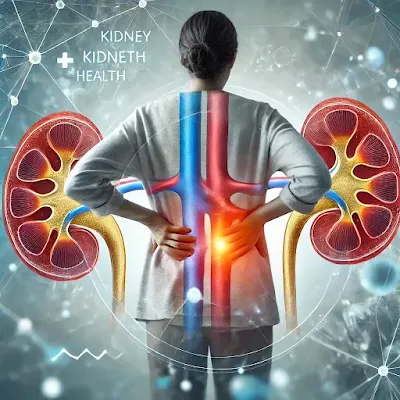Overview of Kidney Disease
The kidneys are essential organs responsible for removing toxins, balancing fluids, and regulating vital bodily functions like blood pressure. When kidney function declines, it can lead to kidney disease, a condition that may progress silently over time until significant damage has occurred. In women, kidney disease symptoms can manifest differently due to hormonal and physiological differences, making early diagnosis even more critical.
What is Kidney Disease?
Kidney disease refers to a range of conditions that impair the kidneys’ ability to function properly. It includes acute kidney injury, chronic kidney disease (CKD), and kidney failure. Chronic kidney disease, in particular, is a growing health problem worldwide and often goes undiagnosed in its early stages.
Common Symptoms of Kidney Disease in Females
General Symptoms of Kidney Disease
- Fatigue: Accumulated toxins in the blood lead to persistent tiredness and lack of energy.
- Swelling (Edema): Fluid retention can cause puffiness in the face, hands, or legs.
- Changes in Urination: This includes increased frequency, reduced volume, or blood in the urine.
- Nausea and Vomiting: A sign of waste buildup in the bloodstream.
- High Blood Pressure: Impaired kidney function can disrupt blood pressure regulation.
- Dry and Itchy Skin: A common sign of imbalanced minerals in the blood.
Unique Kidney Disease Symptoms in Women
- Menstrual Irregularities: Hormonal imbalances caused by kidney dysfunction can disrupt menstrual cycles, resulting in missed or heavier-than-usual periods.
- Pelvic Pain: Kidney infections or stones often present as sharp pain in the lower back or pelvic area.
- Urinary Tract Infections (UTIs): Women are anatomically more prone to UTIs, which, if untreated, can escalate to kidney infections.
- Pregnancy Complications: Kidney disease in women of childbearing age can increase the risk of preeclampsia, miscarriage, or premature delivery.
- Bone Weakness: Chronic kidney problems can affect calcium and vitamin D levels, causing osteoporosis or bone pain.
Risk Factors for Kidney Disease in Females
- Diabetes: A leading cause of CKD, particularly in women with poor glucose control.
- Hypertension: Chronic high blood pressure puts strain on the kidneys, leading to damage over time.
- Autoimmune Disorders: Women are more likely to develop conditions like lupus, which can directly harm the kidneys.
- Obesity: Women with higher body mass indexes (BMI) are at increased risk of developing metabolic syndromes linked to kidney disease.
- Recurrent UTIs: Frequent infections can damage kidney tissues if not treated effectively.
- Overuse of Painkillers: Prolonged use of NSAIDs for menstrual pain or chronic aches can harm kidney function.
How is Kidney Disease Diagnosed in Women?
Medical Tests for Early Detection
- Blood Tests: Elevated creatinine levels or a low eGFR indicate kidney dysfunction.
- Urine Analysis: Detects protein leakage (proteinuria) or blood in the urine.
- Imaging Tests: Ultrasound and CT scans help identify structural abnormalities.
- Kidney Biopsy: A sample of kidney tissue is taken to determine the extent of damage.
Management and Treatment Options
Lifestyle Modifications
- Healthy Diet: A low-sodium, low-phosphorus diet supports kidney function.
- Physical Activity: Regular exercise reduces the risk of diabetes and hypertension.
- Hydration: Adequate water intake prevents kidney stones and supports filtration.
Medical Treatments
- Medications: Blood pressure drugs, supplements for anemia, and diuretics.
- Dialysis: A life-saving treatment for advanced stages of CKD.
- Kidney Transplant: The best option for end-stage kidney disease.
Preventive Measures for Kidney Disease
- Control Diabetes and Hypertension to lower the risk of CKD.
- Have regular checkups, especially if you have a family history of kidney disease.
- Stay hydrated to prevent UTIs and kidney stones.
- Limit the use of NSAIDs and other nephrotoxic medications.
- Quit smoking to improve overall kidney health.
Conclusion
Kidney disease in women is a serious condition that requires awareness and proactive care. By understanding the unique kidney disease symptoms in females, identifying risk factors, and taking preventive steps, women can protect their kidney health and improve their overall quality of life. Early detection and management are the keys to better outcomes.



